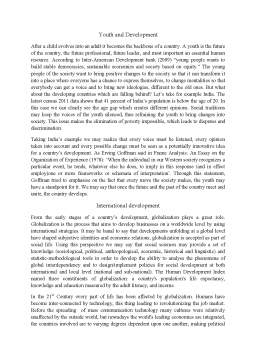Extras din referat
When we are thinking about ‘development’ a lot of words may come into our minds. We cannot focus on development only in a specific field. Humans may develop, but at the same time society does the same. Economics, politics, demography, psychology, every field develops. Social science is concerned especially with society and social relations between humans, but it also has many other branches such as: management, anthropology, history, human geography, linguistics and so on. But what is ‘development’ actually? Many social scientists have tried to define this term and some even came up with some theories focusing on how society can develop. Among these scientists we can mention Karl Marx, Sigmund Freud, Anthony Giddens, Erving Goffman, James Coleman and many others. Each one of these scientist tried to see development form may points of view (political development, economic development, personal development), or even tried to study how development appears and evolves.
To reveal what social scientist meant by ‘development’ we must analyse every scientists’ point of view in particular. In this essay I want to show that development is a global process which doesn’t analyse just the evolution of an individual, but rather analyses the evolution of individuals seen as a society which later contributes to the global development.
Development of children by Sigmund Freud
Sigmund Freud was a social scientist which in 1905 proposed that children develop in a series of fixed psychological stages, which he called: ‘oral, anal, phallic, latency, and genital’. Freud Theory says that each psychological stage is associated with a conflict which must be solved before advancing into new stage. The oral stage (0-1 year old) is the first stage of personality development. It is called ‘oral’ because Freud believed that at this stage the libido is concentrated into the baby’s mouth and to satisfy this libido the baby gets much satisfaction by putting things into its mouth. This may become a fixation in later life which can be seen at smokers, nail-bitters or thumb suckers. The second stage called ‘anal stage’ (1-3 years) is the stage where the children’s ego develops. The children realise they are persons and their wishes can bring them into conflict with the outside world. These ‘conflicts’ are for example the potty training, when parents start to impose restrictions. The ‘phallic stage’ (3-6 years) is when children become aware of the differences between anatomical sex differences. After this stage, no further psychosexual development takes place during the ‘latency stage’. Freud believes that during this stage the libido is dormant and the children focus on achieving new sets of skills. The last stage of children development is called the genital stage. This takes place starting from puberty and last until adulthood. During this stage the child’s sexual instinct develops and the adolescent starts to experiment sexually. This stage usually ends when the adolescent enters adulthood and settles down in a one-to-one relationship.
Development is a long, time-consuming process, which starts with one person at a time. If we look at Freud’s theory, every baby develops into an adult which contributes to the society. This contribution regards economy, social relations, politics and personal believes.
Youth and Development
After a child evolves into an adult it becomes the backbone of a country. A youth is the future of the country, the future professional, future leader, and most important an essential human resource. According to Inter-American Development bank (2009) “young people wants to build stable democracies, sustainable economies and society based on equity.” The young people of the society want to bring positive changes to the society so that it can transform it into a place where everyone has a chance to express themselves, to change mentalities so that everybody can get a voice and to bring new ideologies, different to the old ones. But what about the developing countries which are falling behind? Let’s take for example India. The latest census 2011 data shows that 41 percent of India’s population is below the age of 20. In this case we can clearly see the age gap which creates different opinions. Social traditions may keep the voices of the youth silenced, thus refraining the youth to bring changes into society. This issue makes the elimination of poverty impossible, which leads to disputes and discrimination.
Bibliografie
http://classroom.synonym.com/effects-globalization-21st-century-13074.html
https://www.foreignaffairs.com/articles/united-states/2011-06-02/globalization-and-unemployment
http://www.investopedia.com/articles/economics/10/globalization-developed-countries.asp
http://www.sharing4good.org/article/youth-and-development-role-social-worker
https://www.simplypsychology.org/psychosexual.html
Books:
Michael Spence (2011), The Impact of Globalization on Income and Employment, The Downside of Integrating Markets
Erving Goffman (1974), Frame analysis, An Essay on the Organization of Experience
Online Sites:
http://classroom.synonym.com/effects-globalization-21st-century-13074.html
https://www.foreignaffairs.com/articles/united-states/2011-06-02/globalization-and-unemployment
http://www.investopedia.com/articles/economics/10/globalization-developed-countries.asp
http://www.sharing4good.org/article/youth-and-development-role-social-worker
https://www.simplypsychology.org/psychosexual.html
Preview document
Conținut arhivă zip
- What do social scientists mean by development.pdf








